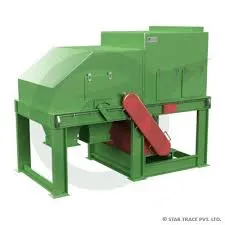

ធ្នូ . 04, 2024 18:25 Back to list
The Importance of Shredder Metal Recycling
In today’s increasingly industrialized world, metal recycling plays a vital role in conserving natural resources, reducing environmental impact, and promoting sustainability. One of the most efficient methods for processing metal waste is through shredding, which is not only effective but also essential in the recycling chain. Shredder metal recycling refers to the process of using shredder machines to break down large pieces of metal scrap into smaller, more manageable sizes, making it easier to transport, sort, and ultimately recycle.
Understanding Shredder Metal Recycling
The first step in shredder metal recycling is the collection of metal waste, which can include a vast range of materials such as old vehicles, appliances, industrial machinery, and construction debris. These materials are often bulky and difficult to handle in their original form. This is where shredder machines come into play. These high-powered machines are designed to reduce large chunks of metal into smaller fragments, often the size of a fist or smaller. This shredding process helps to liberate different types of metals from their composite materials, facilitating easier separation.
Once the metal is shredded, it can be processed further for recycling. Generally, metals fall into two categories ferrous and non-ferrous. Ferrous metals, such as steel and iron, contain significant amounts of iron and are magnetic, making them easier to separate with magnets. Non-ferrous metals, such as aluminum and copper, do not contain iron, which means they require different sorting methods. Advanced sorting technologies, including air classifiers and eddy current separators, can significantly enhance the efficiency of separating these different types of metals.
Environmental Benefits of Shredder Metal Recycling
Shredder metal recycling offers numerous environmental benefits. Firstly, it plays a crucial role in conserving natural resources. The production of new metals from raw materials requires extensive mining and extraction processes, which can have devastating effects on ecosystems. Recycling metal significantly reduces the need for mining, as it allows for the reuse of existing materials.
Secondly, shredding and recycling metals contribute to a reduction in energy consumption. The energy required to recycle metals is substantially lower than that required to produce them from virgin materials. For instance, recycling aluminum saves around 95% of the energy compared to producing aluminum from bauxite ore. This not only leads to cost savings but also reduces greenhouse gas emissions, thereby mitigating climate change.

Economic Advantages of Shredder Metal Recycling
In addition to its environmental benefits, shredder metal recycling is also economically advantageous. The recycling industry has become a significant contributor to the global economy, creating thousands of jobs and supporting local businesses. By recycling metal, we can create a circular economy where materials are reused and repurposed rather than thrown away.
Furthermore, the value of metals fluctuates based on global market conditions. Recycling scrap metal can provide a revenue stream for businesses and individuals alike. For example, old cars and appliances often contain valuable non-ferrous metals, which can be sold to recycling facilities for a profit. This incentivizes both consumers and companies to participate in recycling efforts.
Challenges and the Future of Shredder Metal Recycling
Despite its numerous benefits, shredder metal recycling faces several challenges. One significant issue is contamination. Shredded metal can become mixed with other materials, such as plastics or hazardous substances, which can complicate the recycling process. It is crucial for recycling facilities to invest in advanced sorting technologies and maintain strict protocols to minimize contamination.
The future of shredder metal recycling looks promising, with a growing emphasis on sustainability and environmental protection. As technology continues to advance, we can expect even more efficient methods for sorting and processing metals. Additionally, increased public awareness about the benefits of recycling may drive further participation in metal recycling programs.
In conclusion, shredder metal recycling is an essential component of modern waste management and environmental conservation. By efficiently processing metal waste, we can conserve natural resources, reduce energy consumption, and promote economic benefits. As we move toward a more sustainable future, embracing and improving upon shredder metal recycling practices will be crucial in ensuring the health of our planet and its resources for generations to come.
Latest news
Troubleshooting Common Eddy Separator Problems
NewsJul.04,2025
The Role of Metal Recycling Plants in Circular Economy
NewsJul.04,2025
The Impact of Recycling Line Pickers on Waste Management Costs
NewsJul.04,2025
Safety Features Every Metal Shredder Should Have
NewsJul.04,2025
How Industrial Shredders Improve Waste Management Systems
NewsJul.04,2025
How Cable Granulators Contribute to Sustainable Recycling
NewsJul.04,2025